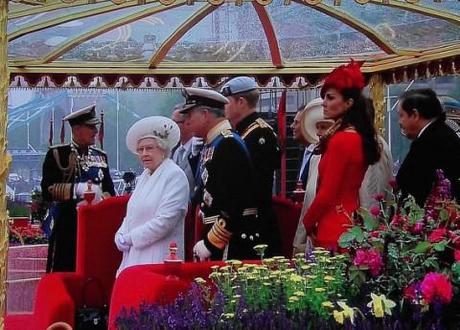
The Royal Family on the river, celebrating the Jubilee: Photocredit: Ninian Reid http://flic.kr/p/cbfkH7
The background
The Queen’s Diamond Jubilee celebrations have come and gone. There was the pageant on the river, which saw over a thousand boats sailing and rowing down it in the rain; there was the concert at Buckingham Palace, and the carriage drive through the City; the thanksgiving service at St Pauls. Whilst the Queen remained stocially celebratory, the Duke of Edinburgh was hospitalised with a bladder infection. So what has Britain made of it all? Are we finally learning to live with ourselves as a post-imperial power? It seems so, with barely a voice of dissent in the commentariat, all of whom agree that the events have made Britain seem a cheerier place once more.
“It has touched me deeply to see so many thousands of families, neighbours and friends celebrating together,” said Queen Elizabeth II in a special address to the nation, quoted on the BBC.
Though it was windy, it was wonderful
This “bread and circuses” was a risk, said Simon Jenkins in The Guardian, as was putting the Queen at the mercy of the wind and rain. The river pageant saw the royals huddling miserably on their barge – it should have been postponed, being “short on color and visual diversion.” It was “too slow.” But the concert, on the other hand, was “a triumph.” The jubilee as a whole marked a shift – from the military to society; rather than the traditional review of naval vessels, we had charities; though the event was over-policed. “There were reportedly snipers on rooftops: to shoot whom?” But in the end, the ceremonies were a relief – “from horror, tragedy and recession.” Everyone smiled, and “the enjoyment is real.” The Sun’s editorial agreed, adding that Britain now seems “brighter, happier, more confident.”
Britain will always be a monarchy
It was certainly “classically British,” said Philip Johnston in The Telegraph, a synthesis of “pomp and pageantry of the highest order.” And it wasn’t just about the Queen – it was “about us, who we are and how we got here.” This was a “periodic act of national renewal.” We’ve seen the return of positive patriotism: and our identity is “so intertwined with having a monarch that we would be a completely different place without one.” Imagine shivering in the cold to celebrate Magna Carta – it’s unlikely indeed. Too right, added The Sun: “Would we really want to scrap such history and heritage for a head of state who is an ex-politician or civil servant?”
It was great, but the BBC was awful; and there was hardly any good oratory
Some people rose to the occasion, said The Times’ leader. The Archibishop of Canterbury made a pointed sermon in which he reminded us that altruism was what we should be doing. How unlike the BBC’s performance, which treated the Jubilee “as entertainment rather than history in the making.” The whole weekend gave us a chance to see what we “really look like,” said Harry Mount in The Times. We’re “still an island nation,” defined by the rivers and the sea: “Our weather and geology are a second set of parents for us all.” Mount added in another piece on The Telegraph that whilst our architecture was shown off brilliantly, we missed a good bit of “memorable oratory.” Nobody knows how to write good speeches any more, which is a great shame.
The Queen is the nation’s Nan – what would we do without her?
Seeing the Queen without the Duke of Edinburgh (who was in hospital with a bladder infection) was “unexpectedly moving,” said Tony Parsons in The Mirror. But “the royal show went on.” He called it the “Woodstock of royal events.” Even “the rotten weather” made the whole thing “unforgettable.” And over these four days, we’ve said thank you to her as a nation. She’s our “Nan.” Now there’s a “bittersweet quality” in the air. And “what will we do without her?” The biggest losers of the weekend, said Leo McKinstry in The Express (who noted in passing how Simon Schama danced to Kylie Minogue at the concert) were the anti-monarchists – they’re the ones who’ve been proved “snobbish elitists totally out of touch with public opinion.”
The Jubilee had its faults, but it did show us that we’re at ease with ourselves
Bah, said Grace Dent in The Independent. The Flotilla was like “the opening credits of 1980s BBC soap opera Triangle.” Making an 86-year-old woman and a 910year-old man “stand for a very long time in sideways rain” is bare-arsed stupid. And boats are a “nice interest” anyway. The Queen looked like she was “dismal.” The only time she smiled was “over the War Horse advert, pardon me, tribute, when a fake horse appeared and whinnied at her.” She probably hates boats. And, said Matthew Norman on The Independent – adding that he didn’t want to come over all Polly Toynbee – the Jubilee did expose the underside of our nation, too. However, the Jubilee did make Britain feel “warm.” It seems we’ve finally learned how to live with ourselves. There was no smugness, no triumphalism; and it looks like we’ve learned to follow the Queen’s example, becoming “senescent with a dash of dignity and grace.”

